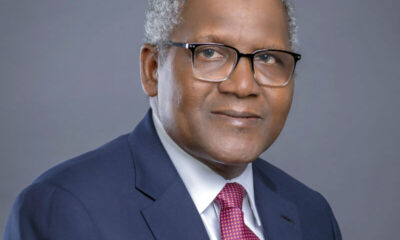Business
Lagos State requires about $33bn investment to meet energy needs – Official

Lagos State requires about $33bn investment to meet energy needs – Official
The Lagos State Government has projected an investment requirement of $14 billion to $33 billion to address its energy generation needs by 2030.
This was disclosed by Mr. Kamaldeen Balogun, General Manager of the Lagos State Electricity Board, during the 15th Ralph Alabi Memorial Lecture and the induction of new corporate members of the Nigerian Society of Engineers (NSE) Ikeja Chapter.
The event, themed “Opportunities in Emerging Power Sector: A Panacea for Economic Stability and Industrialisation”, highlighted the importance of innovative solutions in the power sector for economic growth and industrialisation.
In his keynote address, Balogun stated that the Lagos Bureau of Statistics provided the investment figures, underscoring energy supply as Lagos State’s most significant infrastructure and developmental challenge.
“Lagos State is poised to ensure adequate and reliable power supply to its citizens through the Lagos Electricity Market,” he said.
Currently, Lagos receives only 1,000 megawatts of power daily, available for an average of 12 hours, against the state’s requirement of 9,000 megawatts.
Opportunities in the Power Sector
- Balogun noted that the power deficit presents vast opportunities for investment in the generation, transmission, distribution, and retailing segments of the power value chain.
- He explained that the Lagos power sector offers investment opportunities in Independent Power Plants (IPPs), renewable energy (particularly solar), off-grid and mini-grid solutions for underserved areas, and energy storage systems to improve reliability.
“Emerging sectors like electric vehicle infrastructure and waste-to-energy projects offer long-term potential,” Balogun added.
READ ALSO:
- Kyari dismisses claims of refinery sabotage
- NJC dispels death rumours of two judges that affirmed Tinubu’s election
- Things will get better, Tinubu, Sanwo-Olu assure Nigerians
Leveraging the 2023 Electricity Act
- He further highlighted the significance of the 2023 Electricity Act, which empowers states to generate, transmit, and distribute energy within their jurisdictions.
- According to him, this legal framework positions Lagos to take bold steps toward improving power supply through the Lagos Electricity Market.
“The Lagos Electricity Market Implementation Plan is a key initiative to enhance power generation and distribution, with a target to generate 3,000 megawatts of electricity within the next 30 months,” he said.
Balogun explained that the plan focuses on:
- Grid Modernisation: Upgrading infrastructure with smart technologies to improve reliability and efficiency.
- Renewable Energy Integration: Targeting 1,000 megawatts of power from solar and off-grid solutions to diversify the energy mix.
- Public-Private Partnerships (PPPs): Encouraging private sector involvement to finance energy projects and expand infrastructure.
“It includes a strong focus on capacity building, ensuring workforce training for engineers, technicians, and craftsmen in the power sector,” Balogun stated.
Lagos State requires about $33bn investment to meet energy needs – Official
Auto
The Beast Goes Hybrid: Jetour G700 Unleashes 900HP Fury

The Beast Goes Hybrid: Jetour G700 Unleashes 900HP Fury
Forget everything you thought you knew about “sensible” hybrids. The Jetour G700 has arrived—and it didn’t just enter the room; it kicked the door down, waded through a river, and parked itself on the throne of the premium SUV world.
If a luxury penthouse and a monster truck had a high-tech love child, this would be it.
Design: The Art of Intimidation
At first glance, the G700 stands as a monolith of modern engineering. Measuring nearly 5.2 meters in length, its silhouette defines what can only be described as “Boxy Chic.”
With a towering stance, matrix LED headlights, and a grille bold enough to swallow a lesser hatchback whole, the G700 commands respect even before the key fob is pressed.
It doesn’t just have road presence—it has its own gravitational pull.
Performance
Beneath its shimmering paintwork lies the Kunpeng Super Hybrid CDM-O system—a 2.0L turbocharged engine paired with dual electric motors delivering a staggering 904 horsepower and 1,135 Nm of torque.
READ ALSO:
- Israeli Settlers Torch, Deface West Bank Mosque During Ramadan
- Iranian Army Helicopter Crashes Into Market, Four Killed
- Mother of Three Dies by Suicide After Fiance’s Family Rejects Marriage in Ijebu-Ode
0–100 km/h: 4.6 seconds (in a vehicle this size)
Total Range: 1,400 km
Wading Depth: 970 mm
While others check the weather forecast, you’re essentially piloting a luxury submarine.
Whether executing a “Tank Turn” across dunes or cruising silently at highway speeds, the adaptive suspension and triple differential locks ensure complete dominance over any terrain.
The Interior: A First-Class Flight for Six
Step inside and the rugged exterior gives way to ultra-luxurious serenity. Dominating the dashboard is a 35.4-inch 3K panoramic display—a sweeping digital horizon that makes most home televisions look outdated.
It’s not just a cabin; it’s a sanctuary. From Nappa leather massage seats to an 18-speaker Lexicon audio system with Dolby Atmos, every detail is crafted to shield occupants from the chaos outside.
The “Wow” Features
Military-Grade Assistance: Selected editions feature rear turboprops delivering 3,000 N of additional thrust for extraction from deep mud.
On-Board Fridge: A built-in drawer capable of chilling champagne to -6°C or keeping espresso warm at 50°C.
Oxygen Generator: For high-altitude adventures, the G700 provides an external oxygen supply to support occupants’ health.
The Verdict
The Jetour G700 is more than a vehicle—it is a statement of intent. It eliminates the need to choose between the rugged capability of a desert explorer and the refinement of a limousine.
It reigns as the king of the “Travel+” philosophy, designed for those who want to explore the world without sacrificing comfort.
The established luxury titans should be very, very nervous.
A statement by Jetour Nigeria lists the accredited dealers for vehicle as Elizade Nigeria Limited, New Era AutoVehicle Services Ltd, Kojo Motors, Germaine Auto Centre, Tab Autos Ltd, R.T. Briscoe Motors, and Mandilas Motors.
The Beast Goes Hybrid: Jetour G700 Unleashes 900HP Fury
Auto
Mikano, Autochek Set to Roll Out Virtual Showroom, Expand Auto Finance

Mikano, Autochek Set to Roll Out Virtual Showroom, Expand Auto Finance
Mikano Motors and Autochek Africa are to launch a virtual showroom and expand digital auto financing options in Nigeria, signalling a fresh shift in how vehicles are bought and financed in the country.
The partnership, set for formal unveiling on February 27, 2026, at Mikano Motors’ Victoria Island showroom in Lagos, will see the creation of a dedicated Mikano Motors Virtual Showroom on Autochek’s marketplace.
Through the platform, customers can browse Mikano’s vehicle lineup — including Changan, Maxus and other brands in its portfolio — compare models, and access tailored financing options without leaving the digital space.
Buyers will also be able to explore structured auto loans, flexible payment plans and receive quicker credit assessments within a single ecosystem.
The move effectively migrates critical stages of the car-buying journey online, reducing the delays traditionally associated with financing approvals and documentation.
READ ALSO:
- BREAKING: IGP Kayode Egbetokun Steps Down as Tinubu Names Tunji Disu as New Police Chief
- Osun Police Launch Investigation into Alleged Student Shooting in Osogbo
- U.S. Congress Submits Report to Trump on Alleged Christian Persecution in Nigeria
Group Executive Director of Mikano, Joelle Haykal, said the initiative aligns with the company’s commitment to enhancing customer experience.
“Our goal is not just to sell vehicles, but to simplify ownership,” she said, noting that integrating financing into the buying process gives customers more flexibility and control.
Autochek, a technology-driven automotive marketplace operating across Africa, leverages data analytics to power credit decisions and financial services designed to lower the barriers to vehicle ownership.
By embedding financing directly into vehicle listings, the platform aims to streamline transactions and improve transparency.
Industry analysts say the collaboration reflects a broader trend of digital transformation sweeping across Nigeria’s automotive sector, as dealers and financiers adapt to evolving consumer expectations.
For Mikano Motors, a subsidiary of Mikano International, the deal expands its market reach through digital channels. For Autochek, it strengthens its presence in Nigeria’s new vehicle segment.
Together, both firms are betting on a hybrid retail model that blends physical showrooms with seamless digital access — redefining the path to car ownership in Nigeria.
Business
CBN Mops Up $190 Million to Slow Rapid Naira Appreciation

CBN Mops Up $190 Million to Slow Rapid Naira Appreciation
The Central Bank of Nigeria (CBN) last week intervened in the foreign exchange (forex) market, buying about $189.8 million to slow the rapid appreciation of the Nigerian naira at the official window. Analysts say the move aims to absorb excess US dollar supply, stabilise the currency, and prevent market disruptions that could affect investors and the broader economy.
The naira had strengthened sharply in recent weeks, closing at around ₦1,346.32/$ in the official market — a week-on-week gain of ₦9.09. The parallel market also recorded gains, with rates improving by ₦60 to about ₦1,340/$. As a result, the FX spread — the difference between official and parallel rates — narrowed significantly to 0.47% from 3.29% the previous week, signalling improved convergence between the markets.
TrustBanc Financial Group noted that the naira’s successive rally could have prompted foreign investors to exit the fixed-income market, selling their holdings to repatriate profits. This scenario could have triggered higher US dollar demand, putting additional pressure on the naira and weakening market stability.
READ ALSO:
- FCT Poll: Falana Queries Wike’s Power to Declare Public Holiday
- Iran Threatens ‘Ferocious’ Retaliation as Trump Weighs Military Action
- Tinubu to Governors: State Police Must Begin Now
Normally, central banks sell dollars to support the currency, but the CBN reversed this trend for the first time in months, buying dollars to moderate gains and prevent speculative surges. Analysts said this measured intervention reflects the bank’s commitment to exchange rate stability and orderly FX market operations.
On the macroeconomic front, Nigeria’s external reserves have remained robust, surpassing $46 billion, supporting the CBN’s ability to manage market dynamics. Strong oil prices, rising reserves, and reform-driven FX inflows have contributed to the naira’s stability, even amid lingering geopolitical risks.
Economists warn that excessive naira appreciation could reduce the competitiveness of Nigerian exports and prompt capital flight, affecting domestic investment. By moderating gains, the CBN seeks to balance currency stability, investor confidence, and the nation’s economic fundamentals.
Investors and businesses are being urged to monitor the FX market closely, as central bank interventions may influence short-term forex availability and pricing. Analysts expect the CBN to continue careful market management while promoting long-term currency stability.
CBN Mops Up $190 Million to Slow Rapid Naira Appreciation
-

 Business2 days ago
Business2 days agoDangote Opens Refinery Investment to Nigerians With Public Share Sale Plans
-

 News5 hours ago
News5 hours agoBREAKING: IGP Kayode Egbetokun Steps Down as Tinubu Names Tunji Disu as New Police Chief
-

 Education3 days ago
Education3 days agoUTME: JAMB Clarifies Position on Hijab During Biometric Capture
-

 Politics2 days ago
Politics2 days agoTinubu Hails Wike as APC Dominates 2026 FCT Area Council Elections
-

 Entertainment2 days ago
Entertainment2 days agoRegina Daniels Takes Delivery of ₦150m 2026 GAC Trumpchi M8 SUV
-

 Politics2 days ago
Politics2 days agoFCT Council polls: APC Wins Four Chairmanship Seats as PDP Takes Gwagwalada
-

 News2 days ago
News2 days agoYoruba Muslim Group Dismisses Viral Ramadan Date Claim, Reaffirms Sultan of Sokoto’s Authority
-

 Politics2 days ago
Politics2 days agoOpposition Weakens as Another Governor Eyes APC Move













